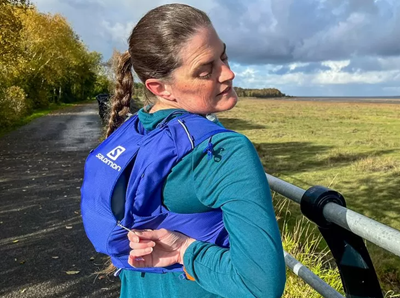
New Tool Helps Spot 'Invisible" Brain Damage in College Athletes
An artificial intelligence computer program that processes magnetic resonance imaging (MRI) can accurately identify changes in brain structure that result from repeated head injury, a new study in student athletes shows. These variations have not been captured by other traditional medical images such as computerized tomography (CT) scans. The new technology, researchers say, may help design new diagnostic tools to better understand subtle brain injuries that accumulate over time.
Experts have long known about potential risks of concussion among young athletes, particularly for those who play high-contact sports such as football, hockey, and soccer. Evidence is now mounting that repeated head impacts, even if they at first appear mild, may add up over many years and lead to cognitive loss. While advanced MRI identifies microscopic changes in brain structure that result from head trauma, researchers say the scans produce vast amounts of data that is difficult to navigate.
Led by researchers in the Department of Radiology at NYU Grossman School of Medicine, the new study showed for the first time that the new tool, using an AI technique called machine learning, could accurately distinguish between the brains of male athletes who played contact sports like football versus noncontact sports like track and field. The results linked repeated head impacts with tiny, structural changes in the brains of contact-sport athletes who had not been diagnosed with a concussion.
"Our findings uncover meaningful differences between the brains of athletes who play contact sports compared to those who compete in noncontact sports," said study senior author and neuroradiologist Yvonne Lui, MD. "Since we expect these groups to have similar brain structure, these results suggest that there may be a risk in choosing one sport over another," adds Lui, a professor and vice chair for research in the Department of Radiology at NYU Langone Health.
Lui adds that beyond spotting potential damage, the machine-learning technique used in their investigation may also help experts to better understand the underlying mechanisms behind brain injury.
The new study, which published online May 22 in The Neuroradiology Journal, involved hundreds of brain images from 36 contact-sport college athletes (mostly football players) and 45 noncontact-sport college athletes (mostly runners and baseball players). The work was meant to clearly link changes detected by the AI tool in the brain scans of football players to head impacts. It builds on a previous study that had identified brain-structure differences in football players, comparing those with and without concussions to athletes who competed in noncontact sports.
For the investigation, the researchers analyzed MRI scans from 81 male athletes taken between 2016 through 2018, none of whom had a known diagnosis of concussion within that time period. Contact-sport athletes played football, lacrosse, and soccer, while noncontact-sport athletes participated in baseball, basketball, track and field, and cross-country.
As part of their analysis, the research team designed statistical techniques that gave their computer program the ability to "learn" how to predict exposure to repeated head impacts using mathematical models. These were based on data examples fed into them, with the program getting "smarter" as the amount of training data grew.
The study team trained the program to identify unusual features in brain tissue and distinguish between athletes with and without repeated exposure to head injuries based on these factors. They also ranked how useful each feature was for detecting damage to help uncover which of the many MRI metrics might contribute most to diagnoses.
Two metrics most accurately flagged structural changes that resulted from head injury, say the authors. The first, mean diffusivity, measures how easily water can move through brain tissue and is often used to spot strokes on MRI scans. The second, mean kurtosis, examines the complexity of brain-tissue structure and can indicate changes in the parts of the brain involved in learning, memory, and emotions.
"Our results highlight the power of artificial intelligence to help us see things that we could not see before, particularly 'invisible injuries' that do not show up on conventional MRI scans," said study lead author Junbo Chen, MS, a doctoral candidate at NYU Tandon School of Engineering. "This method may provide an important diagnostic tool not only for concussion, but also for detecting the damage that stems from subtler and more frequent head impacts."
Chen adds that the study team next plans to explore the use of their machine-learning technique for examining head injury in female athletes.
Funding for the study was provided by National Institute of Health grants P41EB017183 and C63000NYUPG118117. Further funding was provided by Department of Defense grant W81XWH2010699.
In addition to Lui and Chen, other NYU researchers involved in the study were Sohae Chung, PhD; Tianhao Li, MS; Els Fieremans, PhD; Dmitry Novikov, PhD; and Yao Wang, PhD.
Article from Science Daily.
------------------------------------------------------------------------------------------------
Pedagogy Education offers online continuing education courses in a variety of ways to meet your education goals and budget!
Courses may be purchased individually, or in packages (a bundle of courses, offered at a 10% discount). To view our entire catalog of education, click here. We offer a huge selection of infusion, vascular access, and state-specific IV "certification" courses!
We have annual memberships available to individuals or facilities who want to offer their staff access to a library of education for an entire year. Click here to view our Infusion and Vascular Access CE Membership. Facilities can visit our Annual Memberships to learn more about our nurse and nurse aide custom membership options and to view pricing!
Ready to purchase a course, package, or membership? Start here by creating your account! Want to receive our emails with notifications of new course releases and coupon codes good for discounts on courses? Sign up for our emails here. We would LOVE to have you join us on our social media pages, follow us on Facebook, LinkedIn, Instagram, and Pinterest. Watch out for exclusive promo codes!

